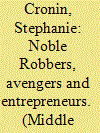| Srl | Item |
| 1 |
ID:
176075


|
|
|
|
|
| Summary/Abstract |
Eric Hobsbawm will forever be a giant intellectual figure. Yet, an aspect of his work is underappreciated—the case for a more pluralistic, dynamic and intellectually inquiring Labour Party. As such, his political thought is particularly relevant given the recent election of Keir Starmer, and the avowed quest for ‘unity’ in bringing Labour back to power. Hobsbawm came to believe that political strategies which sought to exploit social and political stratification and conflict—such as vilifying reformist political movements and those of moderate persuasion—doomed Labour to permanent opposition. A broad‐based people’s party, uniting objectives of solidarity and aspiration, was the only viable class politics. Although from the Marxist tradition, Hobsbawm believed Labour’s purpose was to make liberal democracy function more effectively, rather than creating an alternative economic and political system. Suggesting conflict was more suited to kung fu movies, Hobsbawm’s predominant theme of ‘anti‐factionalism with a purpose’ remains apposite today.
|
|
|
|
|
|
|
|
|
|
|
|
|
|
|
|
| 2 |
ID:
145807


|
|
|
|
|
| Summary/Abstract |
Banditry has been endemic across the Middle East and North Africa. Yet the Middle Eastern experience of banditry has thus far failed to receive sustained academic attention. In particular, the debates stimulated by Eric Hobsbawm's thesis of social banditry have elicited only a few responses from scholars of the Middle East and North Africa, and these largely negative. This article asks to what extent the recent work done in the field of ‘Bandit studies’ helps to elucidate the experience of the Middle East and North Africa. Why has there been such a lack of interest in banditry when the phenomenon itself, and rural crime in general, was so widespread? Why are so few individual bandits celebrated or reviled? What do we mean by banditry in the Middle Eastern context, who became a bandit, why and in what circumstances, what did bandits do and how was this perceived by elites and subalterns, what were the connections between bandits and peasants and between bandits and the worlds of power and, perhaps most importantly, who has written about bandits and what sources have they used?
|
|
|
|
|
|
|
|
|
|
|
|
|
|
|
|